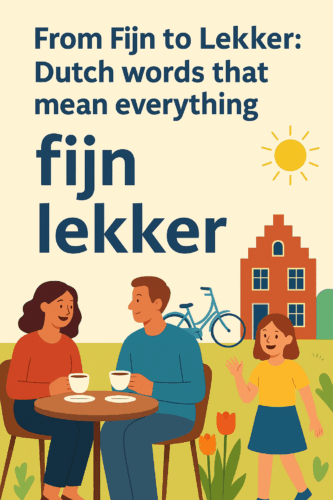From 'fijn' to 'lekker', Dutch words that mean everything

The Dutch language is full of words that can have different meanings depending on the situation. For non-native speakers, this is often confusing, but for us, they are the key to understanding Dutch culture. Two of these superwords are 'fijn' and 'lekker'.
‘Fijn’: the ultimate expression of satisfaction Fijn literally means ‘pleasant’ or ‘good’.
You use it to express a positive feeling or to show that you like something.
- General satisfaction: You’ve had a good day: ‘Het was een fijne dag’.
- Good news: You hear that something went well: ‘Fijn dat het gelukt is!’
- Wish: You wish someone well: ‘Een fijne vakantie!’
So, ‘Fijn’ is about something that feels nice, gives you a good feeling, or makes you happy.
‘Lekker’: more than just about food!
Most people first learn lekker as ‘tasty’, for example when talking about food: ‘Dat gebakje is lekker’. But in Dutch, lekker means much more than that. It’s about anything that feels good, pleasant, or enjoyable.
- Comfortable: It feels nice: ‘De trui zit lekker’.
- Nice weather: It’s warm and sunny: ‘Wat een lekker weertje’.
- Relaxation: You feel rested: ‘Ik heb lekker geslapen’.
- Doing something you enjoy: ‘Zullen we lekker op de bank hangen’? Lekker is all about enjoyment, something that feels good for your senses or your mood.
The power of ‘fijn’ and ‘lekker’
The beauty of these two words is that they reflect Dutch directness and simplicity. With just one word, you can express how something feels, without needing many details. It’s no surprise that phrases like ‘Het is wat het is’ and ‘Doe maar normaal, dan doe je al gek genoeg’ are so typically Dutch.
Want to learn more about Dutch language and culture?
At Tijd voor Taal in Utrecht, we teach you not only the Dutch language, but also how to truly understand the culture behind it. Get in touch and take your first step toward speaking Dutch with confidence!